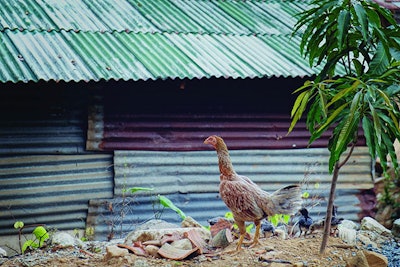
Community engagement and a clever phone app are helping to control poultry and other livestock diseases in Thailand.
The initiative is helping to address not only a lack of official veterinary resources, but also a poor understanding of animal health amongst the general population, and reverse a reluctance to report disease when identified.
Addressing disease threats at source
In rural Thailand, over 75 percent of people keep animals in their back gardens. This represents an extensive potential reservoir for disease, threatening both animal and human populations. The situation is exacerbated by a sometimes poor disease reporting and response system.
However, a new disease reporting system rolled out in part of the country appears to be not only identifying more potential infections, but is resulting in more and quicker responses, stopping potential outbreaks in their tracks.
Created by Chiang Mai University, the surveillance system utilizes an army of volunteers and the Participatory One Health Disease Detection (PODD) app, a smart phone app that allows pinpointed disease reporting in real time.
PODD brings together modern technologies and local communities, with local volunteers act as the eyes and ears for disease surveillance, and was made possible following US$2 million grant from the Skoll Global Threats Fund, which supports initiatives to address pandemics and climate change, amongst other areas.
Following the development of various prototypes and discussions with government officials the system went live in 2015.
Ease of use, engagement
Key to the system’s success is that the app is intuitive and simple to use, and to maintain engagement, users are asked to log in every day, whether there is a disease outbreak or not, but if a poultry or animal disease is suspected then a full report needs to be submitted.
To use the app, volunteers simply to take a photograph off a sick bird or animal, or select a photograph from a photo gallery. On taking the photograph, the GPS position of the camera is automatically captured. Location can also be added from a list.
The volunteer is then asked to a series of short questions, for example, animal type, or number of sick animals, to help explain what has been seen.
To make and send a report takes an average of 2.43 minutes, and all reports are sent to and processed at the PODD Epicenter at Chiang Mai University. The Epicenter is staffed by analysts and researchers, many of whom are veterinarians.
If a report raises concerns, an analyst calls the volunteer for more information and, if necessary, a team is sent for further investigation and specimen collection. If something significant is found, the incident is deemed a Suspected Outbreak, and emails are sent the volunteer, the head of the village, local government officials, public health officials and the district livestock office.
This allows a coordinated response to be mounted, ranging from quarantine to slaughter, and any risk is communicated publicly. As part of the response, updates are sent in real time to all stakeholders. Incoming reports are reviewed and a dynamic situation map is created showing all events under investigation.
As important as the technology is the network of volunteers. PODD volunteers are drawn from various walks of life – ranging from housewives to mechanics. What is important in their selection is that they are integrated into local society – hearing what is going on in the locality.
Each volunteer is given a mobile phone and training on how to use the PODD reporting system. Following basic training, 89 percent of volunteers were found to be able to use the app well, even if they had never used a mobile phone before. Additionally, training on animal health, clinical signs of disease of disease, and disease prevention and control practices has been given.
The feedback from volunteers has been positive. Volunteers have reported that, previously, some farmers there was little value in reporting a disease outbreak as there was never a response. Now, however, not only is there a response, but it comes quickly. Additionally, people are now talking about disease, and this heightened engagement in unexpected ways with some villagers asking to learn how to vaccinate animals while others have built quarantine stations.
At launch, in 2015, the network relied on just 300 trained volunteers. Last year, 4,000 public health volunteers ask to be added to the PODD volunteer roster.
Further spread
2016 saw ownership of PODD transferred to the government and a further grant from Skoll to help support and expand the PODD volunteer program and develop a “train the trainer” model.
This additional funding will help to expand the PODD program from covering 600,000 people in Chiang Mai to all of the provinces residents and in to two more provinces. The Thai government is looking to implement the system further still, initially expanding into 10-15 provinces, before taking it nationwide, should funding become available.
The PODD app was built with open source code, meaning that it can adopted wherever it may be needed, and it can be adapted. In Chiang Mai, fraudulent medicine sales, amongst other concerns, are also being reported.
















